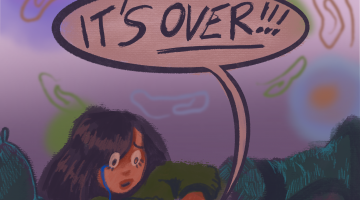Every spring, college graduations across the country spark a seemingly endless onslaught of advice and optimism. Commencement speeches will reflect fondly on the “best years of our lives” and encourage us all to look toward our inevitably bright futures because, after all, this isn’t the end of college, it’s the beginning of something great.
Since our early education, we’ve been taught that a college degree is our golden ticket to a great job and a lifetime of security and happiness. Later, we’re told that the college years are the best of our lives — the years that we’ll make our lifelong friends, have unforgettable experiences and begin to craft successful careers that we’ve always dreamt of.
But that’s mostly bullshit.
The reality is this: not everyone will be wildly successful during or after college. Almost no one will immediately trade their diploma for a six-figure salary. Not everyone will get into the grad school of their dreams. And you know what? That’s 100 percent OK.
This graduation season, let’s remind ourselves that our worth doesn’t depend on how many degrees we earn, that we are more than our job title and that the true value of a college education lies in the personal growth that it facilitates.
The things we learn in college may not make us millionaires, but they often make us better people. Throughout the four (or more) years that we spend at an institution of higher education, we learn to place our lives in the context of history. We learn to see things from the perspectives of others, to hear opinions that are not our own and effectively support the opinions that we hold most dear. We gain the ability to pick apart important issues and analyze the parts that constitute the whole. We become efficient at living away from home and being responsible for our own success and well-being.
These are the skills that will serve us well for the rest of our lives, regardless of how we end up earning a living. They will help us remain empathetic, informed and engaged in the world for the rest of our lives. Careers aren’t permanent, but the ability to grow and adapt that we cultivate during our college years will stick with us until our inevitable demise.
Of course, like all things of great value, the benefits of an education come at a price; we’ve all had days when we’re completely overwhelmed by all our responsibilities and would rather shoot ourselves in the face than read another word about Cartesian dualism. But we persevere, and sometimes, we actually learn something that alters our perspective or presents us with the opportunity to think critically about a topic that is important to us.
These are the opportunities we have in our lives to be truly free-thinking individuals. If we fail to take advantage of them and instead get caught up in trying to outdo our colleagues, we are doing ourselves a much greater disservice than if we fail to have a prestigious internship.
We have the rest of our adult lives to be cogs in the capitalist machine, but we only have our educational careers to steer our lives in the direction of our interest. So in the grand scheme of things, it’s alright if you don’t have a job lined up after graduation. It’s alright if you don’t know exactly what you want to do with your life.
If you don’t have everything figured out, you’re not a failure. Even some of the greatest minds of our generation weren’t immediate successes; Kanye didn’t release an album until he was 27, and now he’s both our century’s greatest artist and the most financially successful philosopher in history. If you’re approaching 25 and still haven’t “made it,” you most certainly are not alone, and you most certainly are worth more than other people’s evaluation of your productivity. But most importantly, you have a whole life ahead of you, full of potential that won’t expire once you pass a certain age.
When you leave this institution, don’t leave behind the lessons it taught you. Hold on to the resilience, the successes, the failures, the moments of joy, the moments of self-doubt and outright hopelessness, hold on to everything. They are what will remind you that if you can get through college, you can get through anything, even living with your parents again.
The Nevada Sagebrush editorial board can be reached at tbynum@sagebrush.unr.edu and on Twitter @TheSagebrush.










